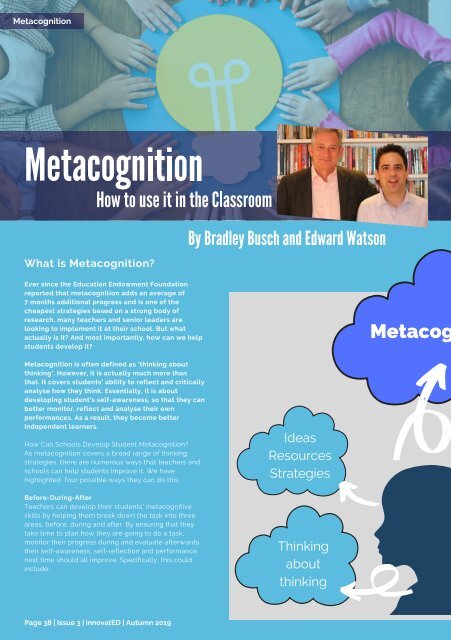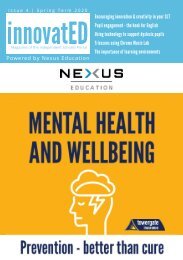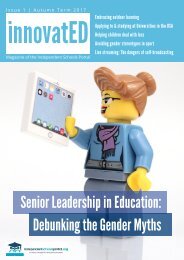innovatED Magazine - Issue 3 - Autumn 2019
A lively mix of news, articles, opinion, research, insight and regulatory updates. We take a global perspective and bring the latest developments and outstanding practice from across the world and across different sectors to enable educators to deliver the very best for their pupils. Produced by an experienced and knowledgeable teaching and school leadership team, innovatED is a termly must-read for all staff rooms.
A lively mix of news, articles, opinion, research, insight and regulatory updates. We take a global perspective and bring the latest developments and outstanding practice from across the world and across different sectors to enable educators to deliver the very best for their pupils. Produced by an experienced and knowledgeable teaching and school leadership team, innovatED is a termly must-read for all staff rooms.
Create successful ePaper yourself
Turn your PDF publications into a flip-book with our unique Google optimized e-Paper software.
How to use it in the Classroom<br />
Metacognition<br />
Metacognition<br />
What is Metacognition?<br />
By Bradley Busch and Edward Watson<br />
Ever since the Education Endowment Foundation<br />
reported that metacognition adds an average of<br />
7 months additional progress and is one of the<br />
cheapest strategies based on a strong body of<br />
research, many teachers and senior leaders are<br />
looking to implement it at their school. But what<br />
actually is it? And most importantly, how can we help<br />
students develop it?<br />
Metacog<br />
Metacognition is often defined as ‘thinking about<br />
thinking’. However, it is actually much more than<br />
that. It covers students’ ability to reflect and critically<br />
analyse how they think. Essentially, it is about<br />
developing student’s self-awareness, so that they can<br />
better monitor, reflect and analyse their own<br />
performances. As a result, they become better<br />
independent learners.<br />
How Can Schools Develop Student Metacognition?<br />
As metacognition covers a broad range of thinking<br />
strategies, there are numerous ways that teachers and<br />
schools can help students improve it. We have<br />
highlighted four possible ways they can do this.<br />
Before-During-After<br />
Teachers can develop their students’ metacognitive<br />
skills by helping them break down the task into three<br />
areas; before, during and after. By ensuring that they<br />
take time to plan how they are going to do a task,<br />
monitor their progress during and evaluate afterwards,<br />
their self-awareness, self-reflection and performance<br />
next time should all improve. Specifically, this could<br />
include:<br />
Ideas<br />
Resources<br />
Strategies<br />
Thinking<br />
about<br />
thinking<br />
Page 38 | <strong>Issue</strong> 3 | <strong>innovatED</strong> | <strong>Autumn</strong> <strong>2019</strong>






